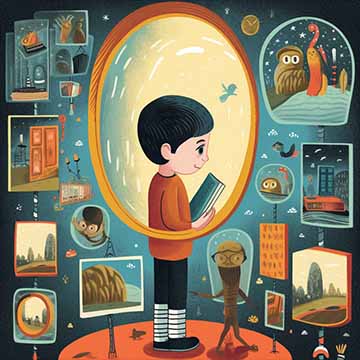
How To Foster Emotional Intelligence In Children
Emotional intelligence is a vital aspect of a child’s development, often overlooked in favor of cognitive skills. However, a child’s ability to understand and manage emotions impacts their social relationships, academic performance, and even their future careers.
One innovative way to foster emotional intelligence in children is through nonviolent children’s books. These works, unlike many children’s classics such as Hansel and Gretel or Little Red Riding Hood, are not resolved by violent acts. And they’ve been shown to help children build empathy, improve emotional intelligence and learn to solve conflicts peacefully.
Storytelling has a unique power to captivate children’s imaginations by taking them on journeys where they can experience the challenges, triumphs and failures of the characters. It also helps them cultivate empathy, an essential component of emotional intelligence.
Dr. Marc Brackett, the founding director of the Yale Center for Emotional Intelligence, says that emotions can drive learning, decision-making, creativity, and relationships.
Nonviolent children’s books can play a pivotal role in this emotional learning process. They deal with real-life scenarios – such as family dynamics, friendship struggles, personal failures, and triumphs – that are much more relatable than fantasy storylines.
These books are not just about the story they tell, but also about the emotions they evoke.
Take Charlotte Zolotow’s Mr. Rabbit and the Lovely Present. It centers around a little girl who needs help finding the perfect birthday present for her mother. And, with the aid of Mr. Rabbit, she navigates her feelings of uncertainty and learns the importance of thoughtful giving.
In another compelling story, Corduroy by Don Freeman, a teddy bear in a department store waits to be taken home. The story delves into the emotions of loneliness, hope, and joy, all the while emphasizing the value of acceptance and friendship.
Frog and Toad are Friends by Arnold Lobel explores themes of friendship, loyalty, and empathy. Children can relate to Frog and Toad’s experiences and the emotions they elicit, from the disappointment of not receiving a letter to the joy of spending time with a friend.
Discussing stories with children is crucial in fostering their emotional intelligence. Questions such as, “How do you think Frog felt when Toad didn’t show up?” encourage children to reflect on the characters’ feelings and motives.
Such reflections promote self-awareness and empathy – two critical components of emotional intelligence – giving them a mirror into their own emotions and a window into the feelings of others.
